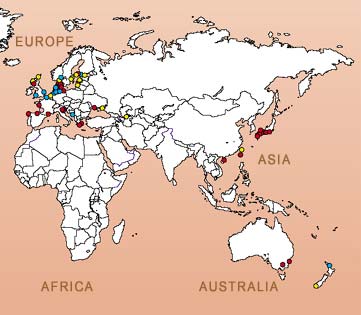
It is well known that the health of the world’s oceans is degrading as a result of human activities; this also includes the impacts of climate change. The human population is predicted to grow at unprecedented rates during the next 20 years and thus it extend the range of its activities and increase its demands for maritime related services, and marine resources, many of which are infinite. The ramifications of these activities are that the world’s oceans and coasts will be increasingly stressed and move to a situation where on they may not be able to sustain the ecosystems they currently maintain.
The GESAMP Report no 70, 2001 noted that biggest threats to the health of the marine environment are:
Maritime Sectors especially fishing and maritime transport systems have specific interaction with the marine environment and along with the benefits that are derived from utilizing the marine environment for resources or as a system for transport there is a need to ensure that those demands do not impinge upon the capacity of the marine environment to remain dynamic.
The oceans are a vast resource which contribute and underpin much of the population of the global society and its usefulness is continuing to be realized. Therefore it is without a doubt in the best interest of humanity to ensure that they are exploited in a manner that is protective and sustainable, in order to preserve their health and guarantee their continuing viability.
AMSSA recognizes the complexity of the ocean ecosystems and fully understands that there is a delicate balance between complex socio-economic conditions that dictate human behaviour and the managing in a sustainable manner the manipulation of marine resources.
This is a formidable challenge and to ensure that the African maritime sector is furnished with the appropriate guidance and AMSSA intends to develop a robust ‘Marine Environmental Platform’ aimed at policy makers and maritime stakeholders. The platform will be equipped with information about the elements of the global oceans that surround Africa, their biological, chemical and physical processes and the linkages amongst and between them. The Platform will eventually provide a sub-analysis from each country perspective and will identify potential problems and provide realistic action strategies. It is foreseen that the Universities network will provide substantial input into this thematic and by taking this approach it will be assured that long term considerations can be enveloped into strategies.
It is critical to understanding how maritime activities affect and impact the oceans and coasts, and to developing effective management protocols to protect the oceans, coasts and their resources for future generations. To this end, AMSSA will participate in global research programs for dissemination purposes and will also stimulate African based research and programs whose objectives include understanding the ecology of the oceans and determining how anthropogenic activities impact the quality and health of the marine environment.
WORLD MARINE DEAD ZONES
